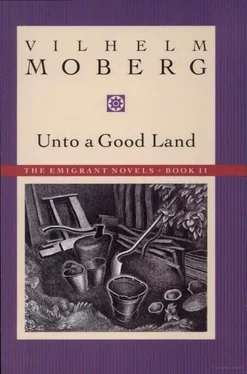Including these passengers on his latest voyage, Captain Lorentz had sailed five hundred of Sweden’s inhabitants to North America. A whole little town his brig had moved across the world ocean. Which one of the two countries ought to be more grateful to the Charlotta and her commander — the kingdom of Sweden or the North American Republic? Sweden got rid of her religious fanatics and other troublesome, law-breaking citizens, but at the same time she lost many useful and capable men. On every voyage, the Charlotta ’s human cargo was nine-tenths thrifty peasants. The lazy and useless ones, the rogues and the deserters, came mostly from other countries, on other ships. Also, of course, many enterprising Europeans found their way to New York; the captain had heard of some who immediately on arrival bought trunkfuls of guns and continued westward to seek a new way of living.
The gentlemen from the Commissioners of Emigration who pried about his ship as soon as it docked used to say that the North American Republic wanted healthy, work-willing, moral immigrants. But no one prevented the sick, lazy, immoral ones from landing, as long as they could walk ashore. The captain was responsible only for the incurably sick and was required to put up a bond. This time, he had to confess, the Charlotta ’s living cargo was badly damaged by seasickness, and scurvy too, after ten stormy weeks at sea. Some of his passengers, during their first weeks in America, would no doubt be unable either to work or to lead immoral lives.
And this time, on arrival in port, Captain Lorentz had been met by a new proclamation: Captains carrying passengers must keep them on board for three days after docking.
The Charlotta ’s gangplank was already lowered, and some of her passengers had gone ashore when the health officer arrived with the new order and sent them back aboard. His question indicated how things stood: Had there been cholera on board the Charlotta ?
New York again was seized by the fear of cholera. Last summer the epidemic had frightened the inhabitants out of town, and this year, with the intense heat, it had flared up again. The authorities thought cholera was brought by emigrant ships from the Old World, and now every ship from a foreign port must be carefully inspected by health officers before the passengers were allowed to step onto American soil.
Crossed-out names on the Charlotta ’s passenger list indicated to the inspector that eight passengers had been buried at sea, but Captain Lorentz could assure him with a clear conscience that none had died of cholera. He once had had that Eastern pestilence on board his ship, and he knew well the signs of the sickness: severe diarrhea, violent vomiting, and a thirst which burned like fire. But his passengers on this voyage had been free from these symptoms. And the inspector himself looked at those still sick and ascertained that the Swedish brig was not bringing cholera to New York. But he warned about an English merchantman, the bark Isaac Webb of Liverpool, arriving the same day as the Charlotta ; on this ship the Oriental pest had raged so horribly that seventy-seven of the passengers had died.
Yes, Captain Lorentz had always known it, human beings were the most annoying and unhealthy cargo in the world.
There were now many additional troubles and complications in getting rid of this cargo. He must keep the passengers on board for another three days, for which he would receive no thanks from those crowded into the hold in this heat. Fortunately, now as always, the sick got well as soon as it was time to land; even the weakest wanted to look their best. Only one passenger caused him real worry and concern, a sixty-five-year-old farm wife from Öland. He had expected her to die before they reached port, he had been so sure of it he had made a mark after her name — like a small cross. He noticed it now as he read the passenger list: Fina-Kajsa Andersdotter. She had become a widow on the North Sea, where he had read the funeral service over her husband. The old woman was so weak from scurvy he had not believed she could survive. If she now were to be taken from ship to hospital, the commander of the Charlotta must post a bond of three hundred dollars with the mayor of New York.
Why in hell would a farm woman go out to sea at such an age? Why should the shipping company be expected to pay three hundred dollars for an old, worn-out hag-body? One way to avoid the bond, perhaps, would be to keep her on board as long as the brig remained in port. While they unloaded the pig iron and other freight, the old woman would no doubt die, and then the health officer would come and fetch the corpse, and the captain wouldn’t even have to think about the funeral.
It was always easier to get rid of dead cargo than living.
— 2—
The passengers were now coming to the cabin to collect their money. A tall, husky man hit his forehead against the cabin ceiling as he came down the ladder. The captain said, “Look out for your skull! You might need it in America.”
An unusually large nose protruded from the man’s face; Captain Lorentz need not ask the name of this farmer, he remembered him well. One night during the voyage — while the worst tempest was raging — he had stanched a hemorrhage for this man’s wife. The peasant had thanked him and said that his wife owed her life to the Charlotta ’s captain.
He consulted the passenger list: “Karl Oskar Nilsson. Paid 515 rdr. bko.”
At the exchange rate of one dollar for each two and a half daler, the farmer had two hundred and six dollars coming to him. But from this sum the captain must deduct the exchange fee and the landing fees for man, wife, brother, and three children.
He told the farmer, “You have to pay thirty-seven and a half daler for six people.”
“Is that the entrance fee to America?”
“We might call it that. There is also the exchange fee. Four dollars — that is, ten daler.”
Lorentz counted and deducted: Balance to pay — a hundred and eighty-seven dollars. He counted out this sum in twenty-, ten-, and one-dollar coins, gold and silver, which he gave to the young farmer, who himself counted the money slowly and carefully. Then he put the coins, one at a time, into a homemade sheepskin belt which he carried around his waist under his shirt. The captain gave the hiding place a nod of approval.
The big-nosed farmer, having received his money, still remained standing in the cabin.
“Do you think you’ve been cheated in the exchange?” the captain asked.
“No. No, it isn’t that. But I would like to ask you about something, Mr. Captain.”
“Yes?”
Karl Oskar Nilsson continued: There were fifteen of them, eight full grown and seven children, all from Ljuder Parish in Småland, who had undertaken the voyage together to this new country. Now they had been delayed at sea, the summer was already far advanced, and they were anxious to reach their destination as soon as possible, so as to be able to find land and get something planted before winter set in. All of those from Ljuder Parish intended to go to Minnesota, where land was said to be reasonably priced for people with little money. Now they wanted to continue their journey without delay; would the captain be kind enough to advise them how to get started inland?
“Have you any definite place in mind?”
“Yes. Here is the name.”
From his purse Karl Oskar took out a soiled, worn piece of paper, once part of an envelope:
Mister Anders Månsson.
Taylors Falls Påst Offis
Minnesota Territory
North-America.
“Who gave you this address?” asked the captain.
“An old woman on board the ship. Månsson is her son. She’s going to him and we’ll all be in the same company; they say there’s good land where her son lives.”
Читать дальше










